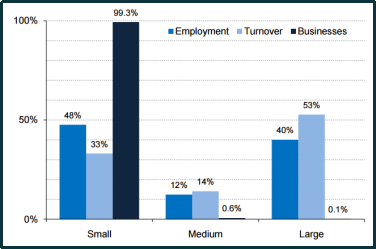Introduction
Typical impacts of entrepreneurs could be evaluated on the management of the small business. The behaviour, culture and nature of the entrepreneur affects the improvement and development of small business organisations. Management of small business organisations are critically assessed through the workings and operation of the entrepreneur. The study conducts a mini-research on examining several entrepreneurship ventures and assessing the data gathered regarding the impacts of small business on the progress of the economy. It also portrays significant impacts on the economic growth through the development of small businesses or5 start-ups after the epidemic of Brexit. The taken up organisation could be considered as Simply Business, London.
Task 1: LO1
P1: Carrying out research for examining various kinds of entrepreneurial ventures and explaining their relation to the entrepreneurship typology
Both large and small business companies are critically important towards determining the performance of the UK economy. It is fruitful to draw a relevant distinction among the individuals working in the organisation's, entrepreneurial ventures and corporate entrepreneurship because they functions are different. According to the observations of DeTienne et al. (2015, p.270), the potentials for growth and innovation have seemed to be different. It is being proposed that any shift into entrepreneurial mode has been observed to be instrumental in initiating and planning up of new ventures. This would in turn, help UK economy in achieving a substantial forward leap within the trends of growth at a particular point in the survival of ongoing ventures. The progressing appreciation of the franchise being entrepreneurial endeavour represents along with multiple disciplinary perspectives has been considered to attract marketing attention, entrepreneurship, management and researchers of small businesses.
Several entrepreneurship Ventures Could Include:
Small Business Entrepreneurial Venture
As per the words of Choi and Majumdar (2014, p.370), small business organisations are mainly private organisations which constitutes business aspects of hairdressers, consultants, travel agents, storefronts, plumbers, carpenters and electricians. They basically hire local workers and are barely profitable. Their success level depends upon earning their livelihood and feed their family. These businesses yet contribute to the national income of the nation such as Simply Business which has increased its selling of insurance after the Brexit incident and thereby contribute in bringing up the economy's growth. In the observations of Battilana and Lee (2014, p.400), their source of investment mainly comes through the funds accumulated from friends or family since they are unable to attract venture capital. Hence the typology of entrepreneur is basically business typology since the proprietor of the business aims at achieving success through making a targeted profit to sustain his or her survival.
Scalable Start-Up Entrepreneurial Venture
These are efficient start-up organisations where entrepreneurs start any company by attracting investments from financial investors and venture capitalists. According to the suggestion of Malek et al. (2014, p.35), the hiring of these firms tend to be brighter and bigger since they aim at accumulating long term profit through investing at present. In order to fuel rapid expansion of the business, these kinds of ventures are set up and they meet their daily profit. This extends the limit of growth of the UK economy and subsequently focuses on enlarging the future prospects. Corporate entrepreneurs are mainly involved in these start-up businesses (Gedajlovic et al. 2013, p.475). The presence of corporate entrepreneurship manages and handles smooth running of the businesses through up-liftment of the coordination and cooperation skills and thereby, manage undertaking of corporate.
Large Company Entrepreneurial Venture
Large companies are often found to have finite and broad life cycles. Their growth is mainly inculcated through sustained innovation and offering innovative products and services which have been variants around the core products. As per the findings of Smith et al. (2016, p.680), the changes within the tastes and preferences of customers, modern technologies and new entrants of competition create huge pressure and disrupt the innovation that requires large business organisations for creating entirely innovative products that are sold to customers in the emerging markets. The typologies of entrepreneurship followed within these organisations involve corporate and business entrepreneurs.
Social Entrepreneurial Venture
Social entrepreneurial ventures are generally public corporations that serve for the betterment of the society based on which creates services and products. As per the knowledge of Mody et al. (2016, p.1100), these organisations mainly aim at reducing the social problems in a society or locality and definitely do not operate for making profits. These entrepreneurs, hence, might be profit making, non-profit making else hybrid. The typology of the entrepreneurs include non-technical yet business entrepreneur who does not focus on earning profits or benefits through the business rather is more concerned about the welfare of the organisation.
P2: Exploring Differences and Similarities among Entrepreneurial Ventures
In the notions of Chell et al. (2016, p.620), the small business organisations, startups and large business organisations are basically private organisations whereas social entrepreneurial ventures are considered to be mainly public organisations. The indispensable difference among these organisations is to be extracted based on the goals and objectives of these organisations. Being a consultant, it could be stated that these entrepreneurial ventures could be distincted from each other on the basis of their profit margins considered they are profit making ventures. According to the findings of van Werven et al. (2015, p.620), all the three ventures such as small business ventures, start ups and large companies aim at increasing profits in order to earn their livelihood in their own way. The success and growth of small business organisations depend on their purpose and motive of setting up their business. They mainly aim at earning the minimum level of income to feed their corresponding families.
As per the statements of Lundqvist (2014, p.98), the startups are even profit making organisations which aim at prolonging and expanding their business sectors by earning significant amount of profit. They also aim at growing at a faster rate through rapid hiring of the employees and get enriched with the human resource availability. Social entrepreneurs on the other hand focuses on improving the wellbeing of the UK economy by providing opportunity and scope to the poorer section of the society to live with their deserving needs (Williams and Williams, 2014, p.30). Large companies or business ventures on the contrary, are fully profit making organisations and are mainly run by the private sector of the economy. All of these have share in the national income accumulation of UK, yet their share contributions are not equivalent in amount.
Task 2: LO2
P3: Assessing and Interpreting Significant Statistics and Data in the Mini-Research for Illustrating Impacts of Small and Micro Businesses on the Economy
In the observations of Ganassali et al. (2013, p.160), the performance of the economy of UK has been always central to the recent assessment and evaluation of Brexit effects on UK. Through the mini-research, it could be explained that according to the growth rate expectations in the UK economy, it was ought to achieve a minimum growth of 0.7% whereas the growth has been observed to be only 0.5% which is 0.2% below the expected growth rate (Smallbusiness.co.uk, 2016). Hence, it could be informed that the growth rate of UK declined. As per the statements of Dhingra et al. (2016, p.24), the impact of this low growth in the Uk economy had been on the operations of small business organisations. The impacts tended to be wide ranging since these organisations could be regarded as the lifeblood of economy of UK. The continuous falling rates of GDP (Gross Domestic product) had potential and large impacts on the executions of small businesses as well as start ups.
Since, after Brexit occurred, the buying or consuming power of the customers had been drastically affected and ultimately led adverse impacts on the working of the small scale business organisations and start ups. According to the implication of Millán et al. (2016, p.30), due to the existence of these start-up or small scale business organisations, there had been an observed growth of 0.8% from, 0.5% in the service sectors of the economy which was remarkable. Contradictory to the service sector, the manufacturing or the construction lines had been notified being declined because of the weaker pound that boosted growth (Smallbusiness.co.uk, 2016). Devaluation of the pound or the currency of UK has resulted in overall growth yet many loopholes had been identified in the significant areas of the economy.
Due to the falling GDP, it has been eventually noticed that small business had to struggle for keeping afloat so that there would not be any fall in the national income of the UK. In words of Marelli and Signorelli (2017, p.130), this is because while importing products now from overseas, the nation has to be cautious for there is very little purchase observed in the domestic country. For having a comparatively lower field operation to the large companies, the small business firms are highly susceptible to the shocks. The bank loans or any type of investment might not be easier to be drafted for Brexit incident and that ultimately leads fatal impacts on the UK economy through their market share earnings. Since, the operation of EU (European Union) had been based on ‘single market' therefore, only EU members could trade along with each other without any export or import duties. This has increased the dependency of UK more on the improvement and expansion of the small scale business enterprises.
P4: Explaining the importance of small and start-up businesses for contributing growth of economy after ‘Brexit'
In the year of 2015, there had been 4.9 million businesses flourished within the economy of UK and over 99% of them had been small business or start up organisations (Fsb.org.uk, 2016). According to the words of Pettigrew and Starkey (2016, p.660), medium as well as small scale enterprises employed 14,424,000 people in the economy of UK in the same year. According to the reviews of European Commission, the performance of SMEs could be depicted by the growth in Gross value Added of €473 billion or approximately 49.8% of the UK economy (Fsb.org.uk, 2016). After Brexit incident, the number of small and start up business organisations have potentially increased by 3% on an average. Around 2 million business firms have been found to be built in the year 2016 with an increase of 59% since the year 2000.
On account of sole proprietorship, the number of small business firms could be stated to increase at a rate of 59% and about 5.5 million private sector companies including start up organisations and small business in the UK have been increased by 97000 which accounts for 2% in the year 2015 (Fsb.org.uk, 2016). Around 3 million micro enterprises have been supportively observed to grow in the recent year of 2016 after the Brexit epidemics which accounted for 96% of the entire business sector. The SMEs (Small and Medium sized Enterprises) increased by 5.4 million and accounted for almost 99% of the entire business sector (Fsb.org.uk, 2016). Hence, according to the viewpoints of McCormack (2016, p.35), due to this robust emergence of micro organisations as well as SMEs, the income or the GDP measure has reached higher levels.

Figure 1: Business market of UK after Brexit
In the findings of Caliendo et al.(2014, p.800), the significance and the importance of these small scaled organisations, micro units and SMEs lie underneath the explanation of prolonged growth in the UK economy even after the brexit incident. Vast majority of the businesses in UK have been found to employ fewer than almost ten people who revealed that this type of business accounted for 32% employment along with 19% turnover due to the Brexit epidemics. Large businesses in the UK economy with almost 250 employees accounted for almost 0.1% of the entire business sector but only 40% of the employment have been ensured whereas 53% of turnover has been accounted (Fsb.org.uk, 2016). This implied that after the incident or occurrence of Brexit, the small scale organisations along with the micro firms have major impacts on the stability of the growth rate of the economy. According to the opinions of Ibrahim and Mas'ud (2016, p.230), they induced the growth and development of the UK economy and indulged into looking for the better prospects to expand business sector both in terms of public and private sectors of the UK economy.
Task 3: LO3
P5: Determining traits, skills and characteristics of entrepreneurs differentiating from business managers
Entrepreneurs refer to any particular individual who is held responsible for creating enterprise by undertaking financial risk for obtaining adequate amount of profit. On the other hand, managers are individuals who undertake the responsibility of administering and controlling organisations. In the viewpoints of DeNisi (2015, p.1000), the prime focus of entrepreneurs remain on the starting up of business for accumulating sufficient level of profits but for manages their indisputable responsibility becomes to supervise ongoing operations. entrepreneurs enjoy profits earned in the organisation as rewards whereas managers earn salary as their rewards.
The entrepreneurs possess different skills and traits to be distinguished from a manager which includes- undertaking moderate risks, solving problems or issues at a consistent rate, long-term involvement in the firm, setting up of goals and objectives, making sustainable and fruitful use of the resources and competing against the standards which are self-imposed. As per the observations of Schlosser (2015, p.50), the managers on the contrary, performs selective functions such as motivating employees and leaders of the organisations, managing business operations and handling clients, work upon to build synchronisation among the workers and indulge in activities for resolving the conflicts.
Therefore, both the organisational members have different work culture with distinct roles and responsibilities from each other. One serve the ownership of the organisation while the other serves for looking after and observing the activities of the organisations. According to the opinions of Edwards-Schachter et al. (2015, p.37), the entrepreneurship possess skills of promoting communication channels for facilitating coordination among the customers and inherit utmost self confidence for hiring and firing the employees and make the organisational performance stable.
P6: Assessing Impacts of Entrepreneurial Personality over Entrepreneurial Mindset and Motivation
Personality as well as other usual motivational effects over the performance is observed to be mediated by task-specific and situational factors of self-efficacy and goals. As per the findings of Ruiz et al. (2016, p.1040), the personality of entrepreneurs reveals about his or her tendencies and intentions concerning the organisation. One can have a clear review of the mindset of the entrepreneur through his or her personality. The way of handling business operations and caring for the management could be easily depicted by the personality of entrepreneurs. Through achieving a stunning personality, the entrepreneur gets self motivated in building up of a firm.
- Free Revisions
- Free Topic Selection
- Free Formatting
- Free Reference Page
Entrepreneurs must keep his or her mind set towards tracking up of the establishment of any organisation. The tenacity of the entrepreneur represents his or her desire and wish to own an enterprise. In the observations of Edwards-Schachter et al. (2015, p.38), relevant skills and expertise is required in an ample way for gauging the establishment of the firm and achieve profits and revenues. Sufficient knowledge about the improvement and development of any business firm must be present so that the entrepreneur gets motivated easily for holding up of the risk. The passion within the entrepreneurs must be inherited for supporting the development and establishment of any new innovative firm such as Simply Business.
Achievement of goals and visioning work as determinants to the mindset and motivation to entrepreneur and thereby, induces or gears up the level of interests in them for growing up any small or micro business. All these are factors that determine the personality of the entrepreneur and state the capabilities and potentialities of the entrepreneurs for building up of the innovative ventures or organisations.
Task 4: LO4
P7: Explaining the way by which Background as well as Experience Foster or Hinder Entrepreneurship
The personal experiences and background of any individual working within an organisation would highly affect the execution of the managerial operations of the organisation or entrepreneurship. As per the observations of Marelli and Signorelli (2017, p.131) there are some social and cultural aspects through which these impacts are usually determined. Through many experiences and examples, it could be evaluated that the personal background and experiences of the employees positively or negatively affect the entrepreneurship of the venture. As per the statements of executives under human resource, diversity at workplace could have ample potential benefits that include developed understanding of marketplace, ability to solve problems and conflicts as well as enhanced creativity.
For example, in any organisation such as Simply Business, it is often evident that the diversified culture and background of employees affect the behaviour and conduct of other employees. As per the suggestions of Lee-Ross (2015, p.1100), conflicts are often observed to arise due to the diversified nature of the employees working around in the organisation. Opposing to this statement, it could be stated that due to the experiences accumulated by the employees at their previous workplace, they become accustomed in handling the conflicts since they do not remain novice anymore. For instance, acquiring several skills of management such as risk assessment, building up of self-confidence, motivating others and encountering challenges could be managed through gathering enough experience.
In the words of Carsrud et al. (2017, p.200), the skills, experiences as well as background of the employees affect propensity of the individuals for becoming entrepreneurs along with likelihood of the success concerning these individuals. Importance of these experiences and skills pertain to the innovation of the entrepreneurship. Innovation in the SMEs at the UK is literally constrained by deficiency in the management skills than by the financial constraints. The background and culture of the employees equally affect the entrepreneurship since the family background as well as culture of the employees determine their behaviour and conduct at the workplaces. Dynamic capabilities of the individuals working under these sectors are built through their experiences gathered from the previous workplaces.
Conclusion
Through the above referred study, it could be stated that due to the development of the small business organisations, economic growth of UK has been identified to be somewhat stable. The contributions of these small scale business enterprises had been considered to be phenomenal and relevant for improving the economic conditions of UK. After the severe and fatal conditions of Brexit, the investment and flourishing nature of these small scale organisations could be revealed as significant. The study thus concludes that after the Brexit epidemic, it would not have been possible to achieve stable national income as well as growth of the economy, if small scale organisations were not there.
References
- Battilana, J. and Lee, M., (2014). Advancing research on hybrid organizing-Insights from the study of social enterprises. The Academy of Management Annals, 8(1), pp.397-441.
- Caliendo, M., Fossen, F. and Kritikos, A.S., (2014). Personality characteristics and the decisions to become and stay self-employed. Small Business Economics, 42(4), pp.787-814.
- Carsrud, A., Brännback, M., Elfving, J. and Brandt, K., (2017). Motivations: The Entrepreneurial Mind and Behavior. In Revisiting the Entrepreneurial Mind (pp. 185-209). Springer International Publishing.
- Chell, E., Spence, L.J., Perrini, F. and Harris, J.D., (2016). Social entrepreneurship and business ethics: does social equal ethical?. Journal of Business Ethics, 133(4), pp.619-625.
- Choi, N. and Majumdar, S., (2014). Social entrepreneurship as an essentially contested concept: Opening a new avenue for systematic future research. Journal of Business Venturing, 29(3), pp.363-376.
- DeNisi, A.S., (2015). Some further thoughts on the entrepreneurial personality. Entrepreneurship Theory and Practice, 39(5), pp.997-1003.
- DeTienne, D.R., McKelvie, A. and Chandler, G.N., (2015). Making sense of entrepreneurial exit strategies: A typology and test. Journal of Business Venturing, 30(2), pp.255-272.
- Dhingra, S., Ottaviano, G., Sampson, T. and Van Reenen, J., (2016). The impact of Brexit on foreign investment in the UK. BREXIT 2016, 33(5), p.24.
- Edwards-Schachter, M., García-Granero, A., Sánchez-Barrioluengo, M., Quesada-Pineda, H. and Amara, N., (2015). Disentangling competences: Interrelationships on creativity, innovation and entrepreneurship. Thinking Skills and Creativity, 16(2), pp.27-39.
You May Also Like:
D/601/0532 Operations Management HND Business Level 5



 Company
Company


















